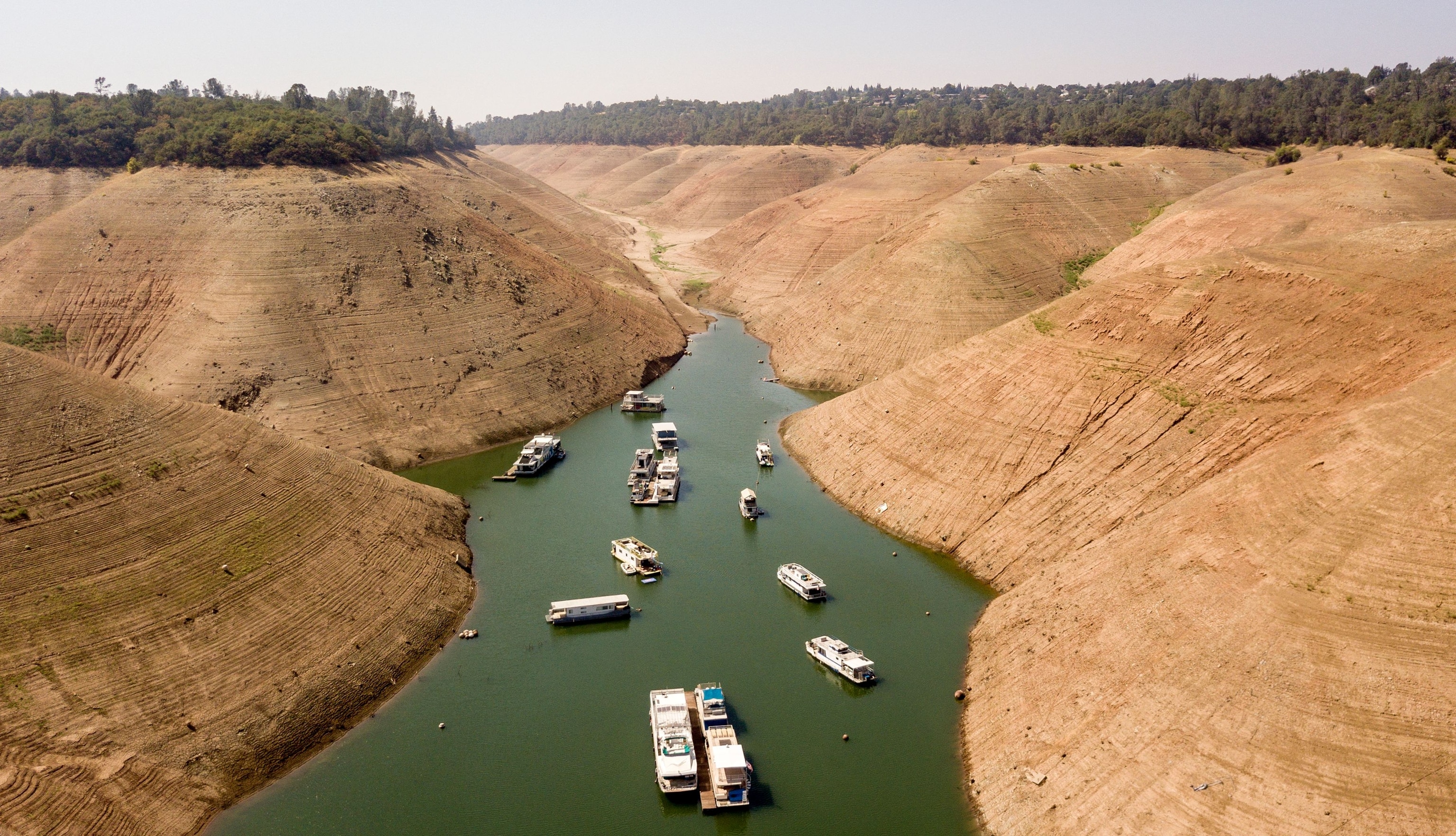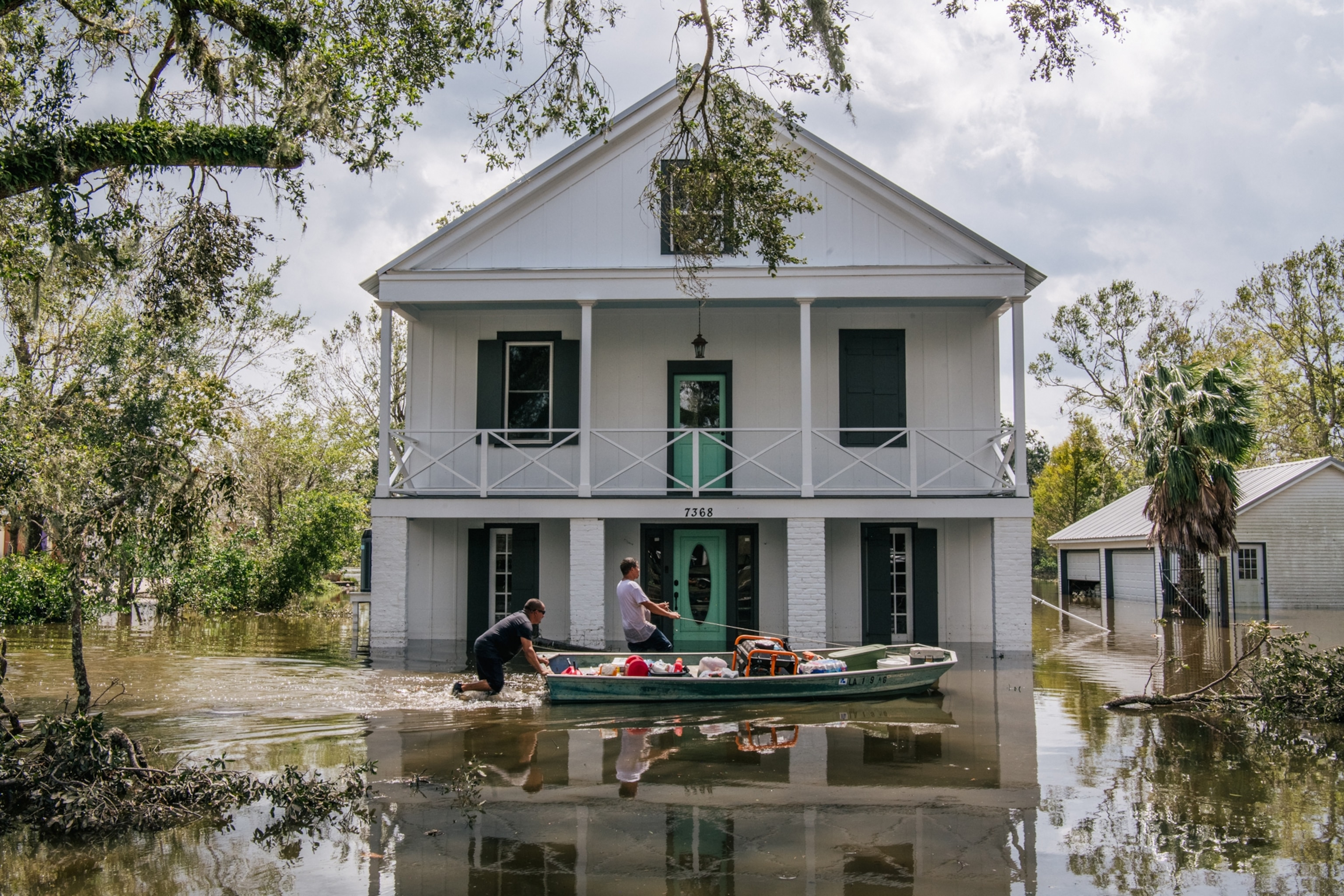
'We just need more hands': Climate experts weigh in on what we can save
Two experts explain why they think warming is on people’s minds more and what the public can do to help curb climate change.
In the decades-long struggle to forestall climate change, some moments have seemed like turning points. In 1992, with much fanfare, the world’s nations signed a treaty at Rio de Janeiro promising action; in 2015, after contentious negotiations, they pledged in Paris to adopt national plans to limit greenhouse emissions. Yet through it all, global greenhouse emissions kept rising—until 2020, when they fell some 7 percent, as a result of reduced fossil fuel usage during global COVID-19 lockdowns.
Ahead of another international gathering in Glasgow this November aimed at reducing carbon emissions, the U.S. Congress is now considering major legislative action on climate change. And the public conversation seems to be taking a hopeful turn. This week, a Yale/George Mason University poll found that for the first time a majority of Americans believe that people in the U.S. are being harmed by climate change. A year of extreme and deadly weather events likely drove the issue home.
National Geographic environment reporter Alejandra Borunda and I spoke recently with two expert observers about whether 2021 finally marks a watershed in public opinion and action. Katharine Hayhoe is a climate scientist at Texas Tech University, chief scientist of the Nature Conservancy, and author of Saving Us, a book about how to talk about climate change. Katharine Wilkinson, a best-selling climate writer and podcaster, is co-editor of All We Can Save, a book of essays on climate by women.
Kunzig:
Alejandra, the weather this year kept finding fresh ways to apall us.
Borunda:
It's just a continuation of a trend towards more and more extremes. Here in California, it became clear pretty early that it was going to be a very dry and probably very hot year. We were seeing streams drying up. Baby salmon dying. People's wells drying up. When the heat started to come, we saw absolutely unprecedented heat waves across the Pacific Northwest. Then, of course, the fires started, which is another thing we've gotten all too used to.
And that's just the American West. Things are happening across the planet—devastating floods in Europe that took hundreds of lives, and in China. And during Hurricane Ida, from the Gulf Coast all the way to the Northeast. Every year as climate reporters, we're cataloging disasters.
Kunzig:
It all started, let's not forget, with the extraordinary winter in Texas. Katharine Hayhoe, what was that like?
Hayhoe:
What was so unusual was that it was cold for so long. It does snow where I live in Texas, but you don't normally get a deep freeze for that long. Everybody noticed it. It was immediately politicized as the governor went on television and said, "Oh, all those wind turbines froze. That's why you don't have power." In the postmortem, it was very clear that it was primarily natural gas that failed the system, not the wind turbines.
What we scientists are starting to be able to do is put numbers on how much worse climate change made specific events. The numbers are horrifying. With the deadly German floods, the attribution study showed that they were nine times more likely as a result of a changing climate. With the wildfires, with the crazy heat waves out West, those were over 150 times more likely because of climate change.
With the winter freeze, we do know now that because the Arctic is warming twice as fast as the rest of the world, it's affecting the polar vortex. So, there's even a connection there. That's why, in my opinion, the best way to talk about what's happening is not global warming— it's global “weirding.” You can't live anywhere in the world without recognizing that things are definitely getting weirder.
Kunzig:
Extreme weather was also one focus of the new report this past summer from the Intergovernmental Panel on Climate Change, the IPCC.
Hayhoe:
The first IPCC report was published in 1990. Since then, there have been six assessment reports. Each is a collection of all the science that's been done in the meantime, reviewed by thousands of scientists from around the world, as well as government entities. So they're the authoritative word on what's happening.
The latest report says that climate change is real and it's [caused by] humans. What's new is this: We humans have never lived through changes as rapid as are happening today. They are affecting every aspect of our lives, most obviously through the impact on extreme events. And the future is in our hands. Our choices are the biggest impact on what happens in the future. Every year matters, every bit of warming matters, every choice matters.
Kunzig:
Katharine Wilkinson, you've spoken in the past of a “great awakening.” Are we seeing it?
Wilkinson:
The gathering intensity of extreme weather events actually parallels what we're seeing in public opinion, but also, more importantly, public engagement. No one wants to be roused from a slumber in this way— scientists bellowing, albeit in their muted tones, or storms raging or losing power or losing an entire town. And yet these are causes for awakening. My antenna reading is that more and more people are asking, "What can I do? How can I help?"

It is both a horrifying moment to be alive on this planet and it is a magnificent moment to be alive. Because we have so much power. I think most of us feel very small in the face of the climate crisis, but there's so much that we can do. So, a lot of my work now is really trying to help people navigate [how] they can be participants in this great transformation.
Hayhoe:
I also feel like the tide is turning. First of all, because we see [climate change] happening and affecting our lives. But we also see that the solutions are here. The solutions are not destroying the economy and going back to the Stone Age. The solutions are clean energies that clean up our air and our water and provide more rural jobs than fossil fuels did. The solutions are returning to some of the ways that we used to do things in the past that made a lot more sense and made us better stewards of our resources. When we have these conversations about climate change, rather than thumping people upside the head with all the dire science, what really connects people and changes their minds is helping them to see how the risks affect them personally and how the solutions have immediate benefits today.
Kunzig:
The pandemic has showed how the most astonishing things can be politicized.
Hayhoe:
Climate denial is part of a toxic stew of issues. People don't wake up in the morning and think, oh, I'm going to deny climate change today, a science that we've known about since the 1850s. They wake up in the morning and check their Facebook feed to see what people who they agree with, people they know, people they trust, are saying. They listen to their favorite news pundit, their favorite news program. What they hear a litany of is, "If we are this type of person, here's what we think about immigration, Russia, COVID, masks, vaccines—and climate change."
The number one predictor of whether we're willing to wear a mask or get vaccinated is where we fall on the political spectrum. Well, guess what? That's exactly what happened with climate change.
Kunzig:
Katharine Wilkinson, you and Ayana Johnson co-edited a book of essays on climate by a diverse group of women.
Wilkinson:
So much of the climate conversation has been shaped by white men. We know that we need the biggest, strongest team we can possibly muster and we need a kaleidoscope of perspectives. It's been incredibly heartening to me to hear from young women who picked up this book and have said, "I was shaking as I read the first essay because I feel like I belong and I feel so empowered."
To actually connect with people on a human level, we have to bring our hearts and our empathy and our stories.
Hayhoe:
With climate change, we're overloaded with doom-filled stories that have very little to do with us and we dissociate from them. We think, well, I can't do anything to save the polar bears. In reality, we [need] stories about how it's affecting us in ways that we immediately identify with and relate to, and then stories about all the amazing solutions that are out there.
It isn't just up to the media. It's up to all of us to do this. Because the only way the world has changed before is when ordinary people decided it had to. Not big, famous people. Not super-rich people. The reason we don't have slavery today, the reason why women can vote, the reason the Civil Rights Act passed, is because ordinary people decided the world had to change. We have to activate every single one of us. Obviously, if we didn't think there were any risks, why would we do anything?
Wilkinson:
The truth [is] burning fossil fuels has gotten us into this mess, and there are people in power who are trying to ensure we keep burning fossil fuels for as long as possible. That sort of accountability I think is important, because otherwise people say, “Oh gosh. Climate change is bad. It's something that's happening.” No, it's something that is being done.
A lot of days, you may not feel genuinely optimistic. You may not feel genuinely hopeful. But you can have the courage to continue to put one foot in front of the other and try to be part of the solution. I think the way we stay courageous is by being linked up together. Because we've got a lot of work to do and we need many, many more hands to help do it.
Kunzig:
What did you see this year that inspired you?
Borunda:
Reporting on shade in Los Angeles. Where it is, who has access to it. There are some communities that have tons of trees and beautiful, cool spaces, and there are communities that have very few. One of the most remarkable things I got to do was spend a lot of time with people trying to fix that problem. Young people from the communities they're planting trees in, who were like, “I am doing something here. In a place that matters to me. For people I care about. For my grandmother who's walking to the bus in the blazing sun.”
Hayhoe:
Last year, during the pandemic, there was a virtual science fair. A sixth grade team where I live in Lubbock, Texas—which is the second most conservative city in the whole U.S.—they won, in their category, a national science fair for a project that looked at how to put carbon back in the soil. They called themselves Carbon Keepers and they developed an outreach program to talk to local farmers about no-till agriculture and regenerative agricultural practices. If a sixth-grader from Lubbock, Texas, could make a difference on climate solutions, could raise awareness, even getting that concept into people's minds that farmers can be heroes when it comes to climate solutions—if they can do it, can't everybody?
And then I look at the macro scale. The fact that, during COVID in 2020, 90 percent of new energy installed around the world was clean energy. You realize climate action is not a giant boulder sitting at the bottom of an impossibly steep hill with only a few hands on it. It is already at the top of the hill. It already has millions of hands on it, pushing that boulder down the hill, and it's already going in the right direction. We just need more hands.
This conversation has been edited for length and clarity.